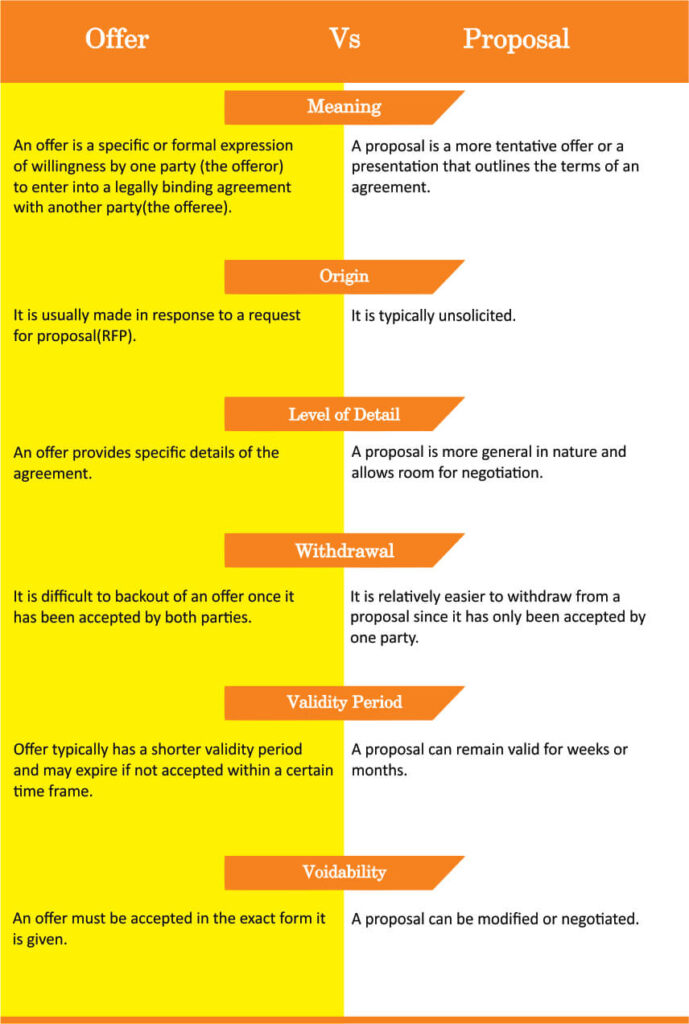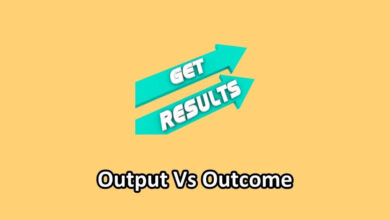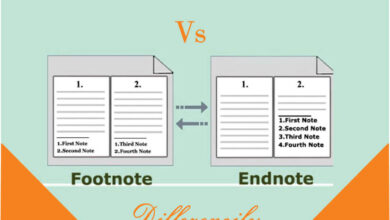Are you tired of feeling confused and uncertain when it comes to offers vs proposals? Do you find yourself wondering why some deals fall through while others succeed? Look no further, because we’re here to help! In this blog post, we’ll break down the key differences between offers and proposals.
An offer is a firm commitment to enter into a contract, whereas a proposal is a more tentative offer that may be withdrawn if not accepted.
Offer Vs Proposal (Comparison Chart)
| Offer | Proposal |
|---|---|
| An offer is a specific and formal expression of willingness by one party (the offeror) to enter into a legally binding agreement with another party (the offeree) | A proposal is a more tentative offer or a presentation that outlines the terms of an agreement. |
| An offer is usually made in response to a request for proposal (RFP) | A proposal is typically unsolicited. |
| It provides specific details of the agreement. | It is more general in nature and allows room for negotiation. |
| It is difficult to back out of an offer once it has been accepted by both parties | It is relatively easier to withdraw from a proposal since it has only been accepted by one party |
| An offer typically has a shorter validity period and may expire if not accepted within a certain time frame. | A proposal can remain valid for weeks or months. |
| An offer must be accepted in the exact form it is given. | A proposal can be modified and negotiated. |
What is an Offer?
An offer refers to a specific proposal to enter into an agreement. It is the first step in the formation of a contract and must include certain elements to be valid. An offer typically includes an expression of willingness to enter into a binding agreement, identification of the parties involved, details regarding the proposed terms and conditions, and a statement of acceptance.
What is a Proposal?
A proposal refers to a document or presentation that outlines an idea, request, project plan, or other proposal and is typically submitted to a potential customer, client, partner, donor, or investor for consideration.
A proposal usually includes an introduction outlining the purpose of the proposal and details of how it will be implemented. It also provides information about the proposer’s qualifications and experience related to the proposed project.
In other words, a proposal is more of a persuasive document. It is a way to convince the recipient of the potential and value of your project, while also outlining the steps and resources needed for successful completion.
Examples of an Offer and a Proposal
The key difference between an offer and a proposal is that an offer creates a legally binding contract, while a proposal does not.
Example of an Offer: I hereby offer to sell you 100 shares of ABC Corporation stock at $10 per share.
This offer is binding on both parties. If you accept this offer, you are agreeing to purchase the stock at $10 per share. If I accept your acceptance of this offer, I am agreeing to sell you the stock at $10 per share. This creates a legally binding contract between us.
Example of a Proposal: I hereby propose to sell you 100 shares of ABC Corporation stock at $10 per share.
This proposal is NOT binding on either party. If you accept this proposal, you are NOT agreeing to purchase the stock at $10 per share. If I accept your acceptance of this proposal, I am NOT agreeing to sell you the stock at $10 per share. This does NOT create a legally binding contract between us.
Key Differences Between an Offer and a Proposal
- Origin – Offers are usually made in response to a request for proposal (RFP), whereas proposals are typically unsolicited.
- Level of Details – Offers generally spell out all of the details of an agreement, including price, quantity, delivery date, and payment terms. Proposals, on the other hand, tend to be more general in nature and leave room for negotiation.
- Withdrawal – It is typically easier to withdraw from a proposal than it is to back out of an offer. This is because an offer has been accepted by both parties, whereas a proposal has only been accepted by one party.
- Validity Period – If an offer is not accepted within a certain period of time, it will typically expire. Proposals, on the other hand, can remain valid for weeks or even months.

When to Use an Offer or a Proposal?
When you’re trying to win a new client or project, you will likely need to submit either an offer or a proposal (or both). But how do you know which one to use?
If there’s already an opportunity on the table and you want to put forward your best terms, an offer is the way to go.
If, on the other hand, you’re trying to create an opportunity – say, by pitching a new idea to a potential client – then you’ll want to use a proposal.
Of course, there are always exceptions to the rule. If you’re not sure which document is appropriate for your situation, it’s best to err on the side of caution and go with a proposal. After all, it can always be revised and tailored as needed once you’ve had a chance to learn more about the opportunity.
Conclusion
Understanding the key differences between an offer and a proposal is essential for anyone looking to enter into any sort of business agreement. Although both documents are similar in many respects, they also have different definitions and purposes.
Knowing which document to use when negotiating a deal can make all the difference in ensuring successful outcomes. By understanding these distinctions, you’ll be better equipped to negotiate effectively and protect yourself from any potential legal issues that may arise down the line.


